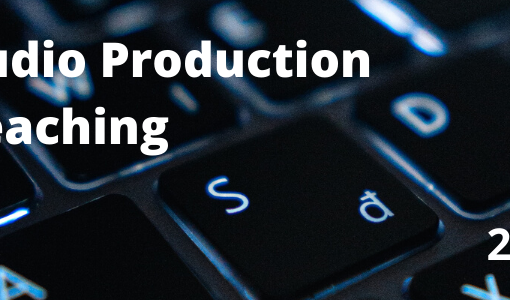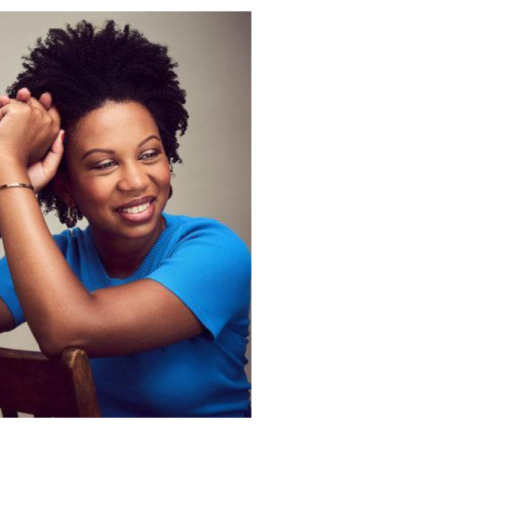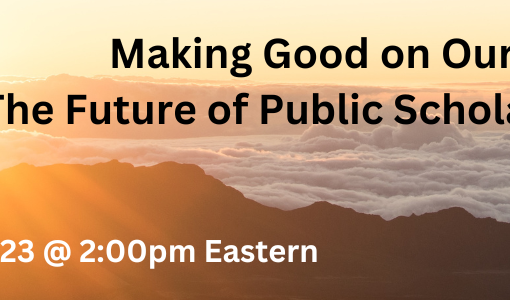Date/Time
Date(s) - 11/05/2021
11:00 am - 1:00 pm
Categories

Every day, thousands of experts are contacted by members of the media to offer context, commentary, interpretation, and opinion on current events. Academics and PhDs all have areas of expertise, many of which can be relevant to these current events. But there is a gulf of uncertainty between knowing your area of expertise and positioning yourself as someone who journalists can call on –– and then, of course, there is the question of what to do if you are called. Nonetheless, for academics and PhDs who want to have an impact beyond their disciplines, media engagement can be an important tool in the toolbox.
This panel –– which consists of both members of the media and faculty who engage frequently with the media –– will consider the ins and outs of media engagement for academics and PhDs. Topics covered include:
- Why, when, and how academics might want to engage with the media
- Genres of media engagement (op-ed, TV interview, print interview, etc.)
- The priorities and objectives of journalists and academics
- The role of media in scholarly communication
- Social media as media
RSVP for this event by registering via Zoom! If you have any accessibility needs for this event, please email us at publicslab@gc.cuny.edu.
The PublicsLab thanks Jeremiah Perez-Torres for his work in organizing this event.
Panel Moderator
 Sean Campbell is an investigative journalist living in New York City. His work has prompted action from members of Congress, change in the CDC, legislation by state lawmakers, and contributed to changing Twitter’s policy. He won the 2020 Les Payne Award for Coverage on Communities of Color from the Society of Professional Journalists’ Deadline Club and a Sidney Award from the Hillman Foundation, among other recognitions. He is an adjunct professor in the Columbia Graduate School of Journalism, and his feature work has been published by ProPublica, The Verge, BuzzFeed News and FiveThirtyEight, among other outlets. He holds BS in aerospace engineering from the University of Florida, an MFA in creative writing from Sarah Lawrence College, and a master of science degree in data journalism from the Columbia Graduate School of Journalism.
Sean Campbell is an investigative journalist living in New York City. His work has prompted action from members of Congress, change in the CDC, legislation by state lawmakers, and contributed to changing Twitter’s policy. He won the 2020 Les Payne Award for Coverage on Communities of Color from the Society of Professional Journalists’ Deadline Club and a Sidney Award from the Hillman Foundation, among other recognitions. He is an adjunct professor in the Columbia Graduate School of Journalism, and his feature work has been published by ProPublica, The Verge, BuzzFeed News and FiveThirtyEight, among other outlets. He holds BS in aerospace engineering from the University of Florida, an MFA in creative writing from Sarah Lawrence College, and a master of science degree in data journalism from the Columbia Graduate School of Journalism.
Panelists
 Jeffrey A. Butts (Ph.D., University of Michigan) is Research Professor and Director of the Research and Evaluation Center at John Jay College of Criminal Justice, City University of New York (CUNY). Previously, he was a research fellow with Chapin Hall at the University of Chicago, director of the Program on Youth Justice at the Urban Institute in Washington, DC, and senior research associate at the National Center for Juvenile Justice in Pittsburgh. Dr. Butts has managed research projects with budgets totaling $51 Million ($60 Million in 2021 dollars) and he has worked with policymakers and justice practitioners in 28 states and several countries. He has published two books, dozens of monographs and reports for government agencies and foundations, as well as articles in academic and peer-reviewed journals. He graduated with a BA in sociology from the University of Oregon and an MSW from Portland State University before earning the Ph.D. at the University of Michigan. Jeff began his justice career as a drug and alcohol counselor with the juvenile court in Eugene, Oregon.
Jeffrey A. Butts (Ph.D., University of Michigan) is Research Professor and Director of the Research and Evaluation Center at John Jay College of Criminal Justice, City University of New York (CUNY). Previously, he was a research fellow with Chapin Hall at the University of Chicago, director of the Program on Youth Justice at the Urban Institute in Washington, DC, and senior research associate at the National Center for Juvenile Justice in Pittsburgh. Dr. Butts has managed research projects with budgets totaling $51 Million ($60 Million in 2021 dollars) and he has worked with policymakers and justice practitioners in 28 states and several countries. He has published two books, dozens of monographs and reports for government agencies and foundations, as well as articles in academic and peer-reviewed journals. He graduated with a BA in sociology from the University of Oregon and an MSW from Portland State University before earning the Ph.D. at the University of Michigan. Jeff began his justice career as a drug and alcohol counselor with the juvenile court in Eugene, Oregon.
 Mariely López-Santana is an Associate Professor of Political Science and Director of the Graduate Program in Political Science at the Schar School of Policy and Government at George Mason University. Dr. López-Santana’s specializes on the politics, institutions, and policies of rich democracies. In her research and teaching she explores issues related to welfare states, poverty and inequality, as well as multilevel governance, federalism, and decentralization. Her book entitled The New Governance of Welfare States in the United States and Europe: Between Decentralization and Centralization in the Activation Era (SUNY Press, 2015) explores contemporary changes in the organization of welfare states in Italy, Germany, Spain, the UK, and the United States. In addition, she has written for the Washington Post and El Nuevo Dia, and has collaborated with NPR, el WAPO Podcast, France 24, Argentinian, Venezuelan and Puerto Rican TV and radio, among others. Dr. López-Santana received her PhD in Political Science from the University of Michigan (Ann Arbor) and received her BA from the University of Puerto Rico.
Mariely López-Santana is an Associate Professor of Political Science and Director of the Graduate Program in Political Science at the Schar School of Policy and Government at George Mason University. Dr. López-Santana’s specializes on the politics, institutions, and policies of rich democracies. In her research and teaching she explores issues related to welfare states, poverty and inequality, as well as multilevel governance, federalism, and decentralization. Her book entitled The New Governance of Welfare States in the United States and Europe: Between Decentralization and Centralization in the Activation Era (SUNY Press, 2015) explores contemporary changes in the organization of welfare states in Italy, Germany, Spain, the UK, and the United States. In addition, she has written for the Washington Post and El Nuevo Dia, and has collaborated with NPR, el WAPO Podcast, France 24, Argentinian, Venezuelan and Puerto Rican TV and radio, among others. Dr. López-Santana received her PhD in Political Science from the University of Michigan (Ann Arbor) and received her BA from the University of Puerto Rico.
 Aaron Morrison is an adjunct lecturer at the CUNY Graduate School of Journalism, where he is teaching a new course about reporting on race and ethnicity. He is a national writer for The Associated Press, where he writes extensively about race, civil rights, criminal justice reform and grassroots social movements. His work has also appeared in The Appeal, a nonprofit criminal justice news outlet covering the biggest drivers of mass incarceration; Mic, where he was a video correspondent and senior writer; and The Record newspaper, in Bergen County, New Jersey. Aaron has more than a decade of experience in journalism.
Aaron Morrison is an adjunct lecturer at the CUNY Graduate School of Journalism, where he is teaching a new course about reporting on race and ethnicity. He is a national writer for The Associated Press, where he writes extensively about race, civil rights, criminal justice reform and grassroots social movements. His work has also appeared in The Appeal, a nonprofit criminal justice news outlet covering the biggest drivers of mass incarceration; Mic, where he was a video correspondent and senior writer; and The Record newspaper, in Bergen County, New Jersey. Aaron has more than a decade of experience in journalism.
 Kara Norton is a science journalist who has reported on a range of issues including the rise of “cyberpoaching” and the illegal wildlife trade, the importance of the Tongass National Forest to climate stabilization and Alaska Native communities, as well as a series of in-depth interviews with the organizers of the viral online movement Black Birders Week. Her work has been published by NOVA on PBS, NATURE on PBS, Only One, Mission Blue, and other top science media publications. She has worked on projects for NOVA Science Studio, TED, and Smithsonian. Prior to her editorial career, she worked as a shark research intern for Bimini Shark Lab, collecting biological data on over five different species of sharks in The Bahamas. This field experience exposed her to shark conservation efforts, and gave her the ability to contribute to a natural history program on the critically endangered great hammerhead shark. Kara holds a BA in journalism and a B.Sc in environmental studies from New York University.
Kara Norton is a science journalist who has reported on a range of issues including the rise of “cyberpoaching” and the illegal wildlife trade, the importance of the Tongass National Forest to climate stabilization and Alaska Native communities, as well as a series of in-depth interviews with the organizers of the viral online movement Black Birders Week. Her work has been published by NOVA on PBS, NATURE on PBS, Only One, Mission Blue, and other top science media publications. She has worked on projects for NOVA Science Studio, TED, and Smithsonian. Prior to her editorial career, she worked as a shark research intern for Bimini Shark Lab, collecting biological data on over five different species of sharks in The Bahamas. This field experience exposed her to shark conservation efforts, and gave her the ability to contribute to a natural history program on the critically endangered great hammerhead shark. Kara holds a BA in journalism and a B.Sc in environmental studies from New York University.






